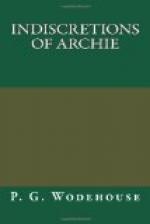It seemed to Archie, as he surveyed his position at the end of the first month of his married life, that all was for the best in the best of all possible worlds. In their attitude towards America, visiting Englishmen almost invariably incline to extremes, either detesting all that therein is or else becoming enthusiasts on the subject of the country, its climate, and its institutions. Archie belonged to the second class. He liked America and got on splendidly with Americans from the start. He was a friendly soul, a mixer; and in New York, that city of mixers, he found himself at home. The atmosphere of good-fellowship and the open-hearted hospitality of everybody he met appealed to him. There were moments when it seemed to him as though New York had simply been waiting for him to arrive before giving the word to let the revels commence.
Nothing, of course, in this world is perfect; and, rosy as were the glasses through which Archie looked on his new surroundings, he had to admit that there was one flaw, one fly in the ointment, one individual caterpillar in the salad. Mr. Daniel Brewster, his father-in-law, remained consistently unfriendly. Indeed, his manner towards his new relative became daily more and more a manner which would have caused gossip on the plantation if Simon Legree had exhibited it in his relations with Uncle Tom. And this in spite of the fact that Archie, as early as the third morning of his stay, had gone to him and in the most frank and manly way had withdrawn his criticism of the Hotel Cosmopolis, giving it as his considered opinion that the Hotel Cosmopolis on closer inspection appeared to be a good egg, one of the best and brightest, and a bit of all right.
“A credit to you, old thing,” said Archie cordially.
“Don’t call me old thing!” growled Mr. Brewster.
“Eight-o, old companion!” said Archie amiably.
Archie, a true philosopher, bore this hostility with fortitude, but it worried Lucille.
“I do wish father understood you better,” was her wistful comment when Archie had related the conversation.
“Well, you know,” said Archie, “I’m open for being understood any time he cares to take a stab at it.”
“You must try and make him fond of you.”
“But how? I smile winsomely at him and what not, but he doesn’t respond.”
“Well, we shall have to think of something. I want him to realise what an angel you are. You are an angel, you know.”
“No, really?”
“Of course you are.”
“It’s a rummy thing,” said Archie, pursuing a train of thought which was constantly with him, “the more I see of you, the more I wonder how you can have a father like—I mean to say, what I mean to say is, I wish I had known your mother; she must have been frightfully attractive.”
“What would really please him, I know,” said Lucille, “would be if you got some work to do. He loves people who work.”




